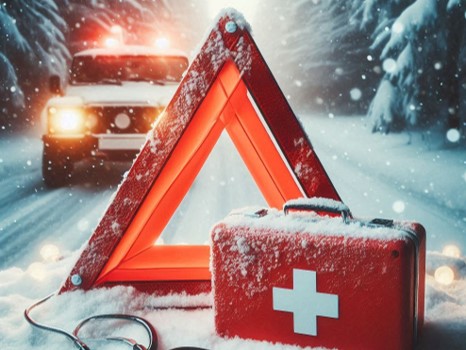

As winter approaches in the United Kingdom, it’s more important than ever to ensure your car is well-prepared for the challenges that come with colder weather. From icy roads to unexpected snowfall, having a well-stocked emergency car kit can provide peace of mind and safety. Here’s a quick guide to assembling a comprehensive winter emergency car kit tailored to the needs of British motorists.
1. Basic Essentials:
At the heart of any emergency car kit are the basics that cater to immediate roadside needs:
Warning Triangles: Essential for alerting other motorists if you’re broken down on the roadside. In the UK, it's advised to place a warning triangle at least 45 metres behind your vehicle.
High-Visibility Vest: Ensures that you’re easily seen by other drivers, especially crucial during nighttime or in poor weather conditions.
First Aid Kit: Should include bandages, plasters, antiseptic wipes, and scissors. The British Red Cross recommends being prepared for minor injuries that can occur on the road.
2. Tools and Equipment:
In case you need to perform quick repairs or adjustments:
Multi-Tool or Basic Tool Kit: Includes screwdrivers, pliers, and a wrench. This can be invaluable for minor fixes.
Tyre Repair Kit and Pressure Gauge: Essential for fixing punctures and ensuring your tyres are properly inflated.
Jump Leads: Vital for restarting a dead battery with the help of another vehicle.
3. Breakdown and Recovery:
Winter weather increases the likelihood of roadside breakdowns:
Tow Rope: Useful for towing your car to a safer location if necessary.
Ice Scraper and De-icer: Crucial during the winter months to keep your windscreen clear and improve visibility.
Blanket and Warm Clothes: In case of a breakdown in cold weather, staying warm is essential while you wait for assistance.
4. Communication:
Staying connected and informed is critical during an emergency:
Charged Mobile Phone and In-Car Charger: Ensure your mobile is always charged to call for help if needed.
Portable Power Bank: An additional power source can be a lifesaver if your car’s battery is dead.
Emergency Contact Numbers: Keep a list of important phone numbers, such as breakdown services, emergency contacts, and local authorities.
5. Additional Winter Essentials:
As winter sets in, consider adding these items to your emergency kit:
Snow Shovel: Useful for digging out your car if it gets stuck in the snow.
Traction Mats or Sand: Helps provide extra grip for your tyres if you’re stuck on an icy or snowy surface.
Thermal Gloves and Hat: Keeping your extremities warm is crucial if you’re stranded for any length of time.
Torch (and Spare Batteries): Essential for visibility during dark winter evenings, and useful for signalling for help.
6. Food and Hydration:
Other items to consider that can enhance your preparedness include:
Non-Perishable Snacks and Water: If you’re stranded for an extended period, having some food and water can be very comforting.
An emergency car kit is a small investment that can make a significant difference in ensuring your safety on the road, especially as winter approaches. Motorists should carefully consider the specifics of their journeys, the climate, and their vehicle’s requirements when putting together their kit. With these essential items, you'll be better equipped to handle the unexpected and stay safe, no matter where your winter travels take you.